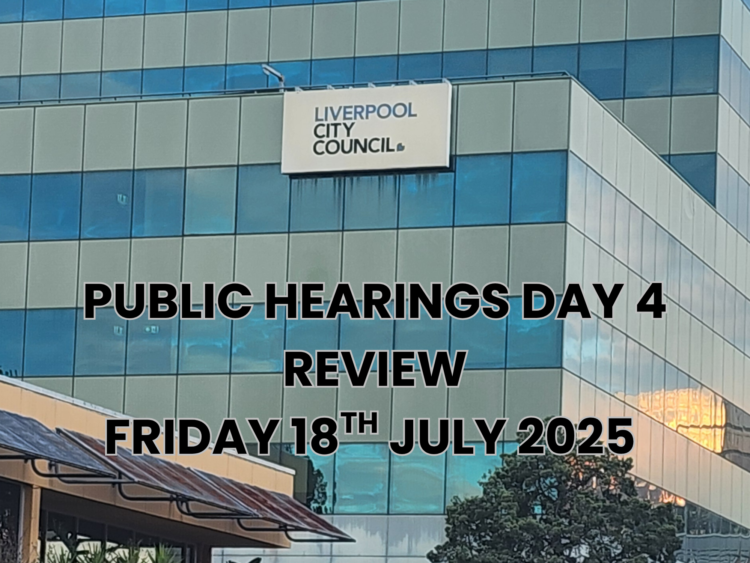On Day 4 of the Public Hearings as part of the Public Inquiry of Liverpool Council we saw evidence given by two employees of Liverpool Council in relation to matters of interest including the purchase of 600 Cowpasture Road and the ongoing issues regarding waste and efficientcy.
The central focus of Day 4 was the testimony of Mr Tim Pasley, Manager of Circular Economy at Liverpool City Council. Mr Pasley’s evidence provided an in-depth look at the council’s waste management operations and the controversial acquisition of a property on Cowpasture Road, a significant expenditure that has raised questions about financial decision-making.
Background
Mr Pasley began working at Liverpool City Council on 8 August 2018 as a Procurement Business Partner, initially focusing on fixing expired contracts within the City Presentation division, which handles operational tasks like rubbish collection, roads, parks, and environmental management. He progressed to Waste and Cleansing Manager in August 2019 (initially in an acting capacity, later permanent around 2020 or 2021), then to Resource Recovery Manager, and briefly acted as Director of Operations or City Presentation from early 2022 to mid-2022. After a three-month leave period ending around October/November 2022, he returned to focus on specific projects, including the Cowpasture Road site, before being appointed as Circular Economy Manager in 2024, overseeing strategic waste initiatives.
Mr Pasley detailed the split between operational and strategic waste management at the council. Operations, under Waste and Cleansing, include internal activities like collecting waste from local parks, CBD areas, bulky waste (kerb-side clean-ups), and mattress collections. Strategic waste, under his Circular Economy role, manages high-cost contracts for household bin collections (three-bin system for over 80,000 households, equating to over 1 million pick-ups monthly) and aims to divert waste from landfill to reduce costs and meet sustainability targets. He highlighted the recent rollout of the Food Organics and Garden Organics (FOGO) program to 62,000 households, aiming to divert 15,000-18,000 tonnes of red bin waste into compostable green bin material, saving on the $320 per tonne waste levy (half of which goes to the state government). For residents, the scale of these contracts and potential levy savings are crucial, but any mismanagement could increase rates or reduce service quality, especially given the historical underinvestment in waste services he noted.
Cowpasture Road Acquisition: Early Investigations and Concerns
A significant portion of Mr Pasley’s testimony focused on the council’s acquisition of a property on Cowpasture Road, purchased by late 2022 for use as a depot and mechanical workshop, replacing facilities at the longstanding Rose Street depot (operational since 1967) and the ancillary Western Depot. The mechanical workshop was relocated to Cowpasture Road by the end of 2022, shortly after acquisition. However, his evidence raised questions about the decision-making process leading to this purchase, which, as noted in earlier hearings, cost $24.75 million initially, escalating to $32.7 million with additional expenses—potentially funded by increases in domestic waste charges
Mr Pasley recounted being invited to inspect the Cowpasture Road site before his leave in mid-2022, while acting as Director of Operations. He could not recall precisely who invited him—possibly the mayor or councillors—but described the visit as casual and unplanned, accompanied by staff including Paul Sharkey, a subject matter expert on workshops. The purpose was vague; he was told to assess the site as a potential workshop, despite not actively seeking a new mechanical facility at the time. He noted the Rose Street depot’s workshop was not up to modern standards, a point supported by public videos on platforms like Facebook or YouTube published by the council. After the visit, Mr Sharkey prepared a report concluding the site was not suitable for leasing, citing its distance from existing operations and a preference for ownership over leasing. Mr Pasley was unaware of plans to purchase the site until he returned from leave, by which time the acquisition had occurred.
Area of Concern for Residents: Councillor Influence and Due Diligence
The involvement of councillors or possibly the mayor in directing staff to inspect Cowpasture Road, without a clear strategic plan or formal process, raises significant transparency concerns. Mr Pasley’s hazy recollection of who initiated the visit and the lack of prior investigation into alternative sites (he confirmed no other leasing options were explored to his knowledge) suggest potential gaps in due diligence. For ratepayers, this is alarming, as the purchase represents a major financial commitment. The presence of councillors and possibly a site owner or family member during the visit, as Mr Pasley recalled, further questions whether political or personal influences drove the decision rather than operational needs, echoing governance issues raised in prior days about internal conflicts affecting council decisions.
Sheldon Rodricks on Waste Contract Management and Operational Challenges
Following Mr Pasley, Mr Sheldon Rodricks, Coordinator of Waste Services at Liverpool City Council, provided evidence that added another layer of concern for residents regarding operational efficiency and contract oversight within the waste management division. His testimony, which came later in the day, focused on the practical challenges and specific incidents that have potentially cost ratepayers significant sums due to mismanagement or oversight failures.
Background and Role at Liverpool City Council
Mr Rodricks started working at Liverpool City Council on 8 August 2018, alongside Mr Pasley, initially in a supporting role within waste operations. He progressed to Coordinator of Waste Services, a position under the operational arm of waste management (distinct from Pasley’s strategic focus), where he oversees day-to-day activities such as kerb-side collections, bulky waste pick-ups, and staff management at depots like Rose Street. His evidence provided a ground-level perspective on the issues within the council’s waste services, complementing Pasley’s strategic overview.
Area of Concern for Residents: Costly Contractual Errors in Waste Management
Mr Rodricks revealed a significant issue with the council’s waste collection contracts, particularly with the contractor responsible for the three-bin system across Liverpool’s 80,000-plus households. He described an incident where the contractor failed to meet key performance indicators (KPIs) for missed bin collections, leading to thousands of resident complaints over a six-month period in 2022. Despite clear breaches documented in council records, Rodricks admitted that penalties outlined in the contract—potentially amounting to hundreds of thousands of dollars—were not enforced due to internal delays in processing performance reports and a lack of clear directive from senior management on penalty application. He stated, “We had the data showing over 5,000 missed collections in one quarter alone, but the decision to apply penalties wasn’t made, and I wasn’t instructed to pursue it.”
Operational Inefficiencies and Staff Management Issues
Rodricks also highlighted operational inefficiencies at the Rose Street depot, particularly around staff rostering and equipment maintenance for bulky waste collections. He recounted instances where inadequate staffing—due to high turnover and delays in hiring caused by budget constraints—led to missed bulky waste pick-ups, with some residents waiting over a month beyond scheduled dates in 2023. He noted, “We often had only half the crews needed for kerb-side clean-ups because of unfilled vacancies, and equipment breakdowns weren’t addressed quickly due to the workshop’s relocation to Cowpasture Road disrupting repair schedules.” This ties into Pasley’s earlier evidence about the depot’s outdated facilities, but Rodricks’ testimony suggests the transition to Cowpasture Road exacerbated rather than solved problems, impacting service delivery directly affecting residents.
Area of Concern for Residents: Lack of Community Consultation on Service Changes
Another contentious point from Rodricks’ evidence was the rollout of the Food Organics and Garden Organics (FOGO) program, mentioned by Pasley as a strategic initiative. Rodricks, from an operational standpoint, revealed that community education and consultation were minimal prior to the rollout to 62,000 households in July 2025. He admitted that many residents were confused about the new bin system, leading to contamination of green bins with non-organic waste, reducing the program’s effectiveness and increasing processing costs. He said, “We had flyers distributed, but many areas, especially non-English speaking communities, didn’t understand the changes, and we saw a spike in incorrect waste sorting.” For residents, this lack of engagement is troubling, as it indicates a disconnect between council operations and community needs, potentially undermining sustainability goals and costing more in cleanup or re-education efforts—again, funded by our rates.
Moreover, the inadequate consultation on initiatives like FOGO highlights a governance issue: the council’s apparent disregard for effective communication with its diverse community. This could erode trust and hinder the success of otherwise beneficial programs, costing more in the long run. Coupled with the Cowpasture Road acquisition concerns raised by Mr Pasley, Rodricks’ evidence suggests a pattern of poor decision-making and oversight that directly impacts our quality of life and financial burden across Liverpool’s suburbs.
Day 4 Public Hearings Transcript
What’s Next for the Inquiry?
The inquiry will continue with additional witnesses on Day 5. Re-appearing before the Commissioner is Mr Farooq Portelli and then important evidence by current Chief Financial Officer Mr Vishwa Nadan.




























So much waste of ratepayers money, including constant re-naming of departments is reprehensible. One could also question the rapid promotion through the ranks to Director position. What process was used to determine these promotions?